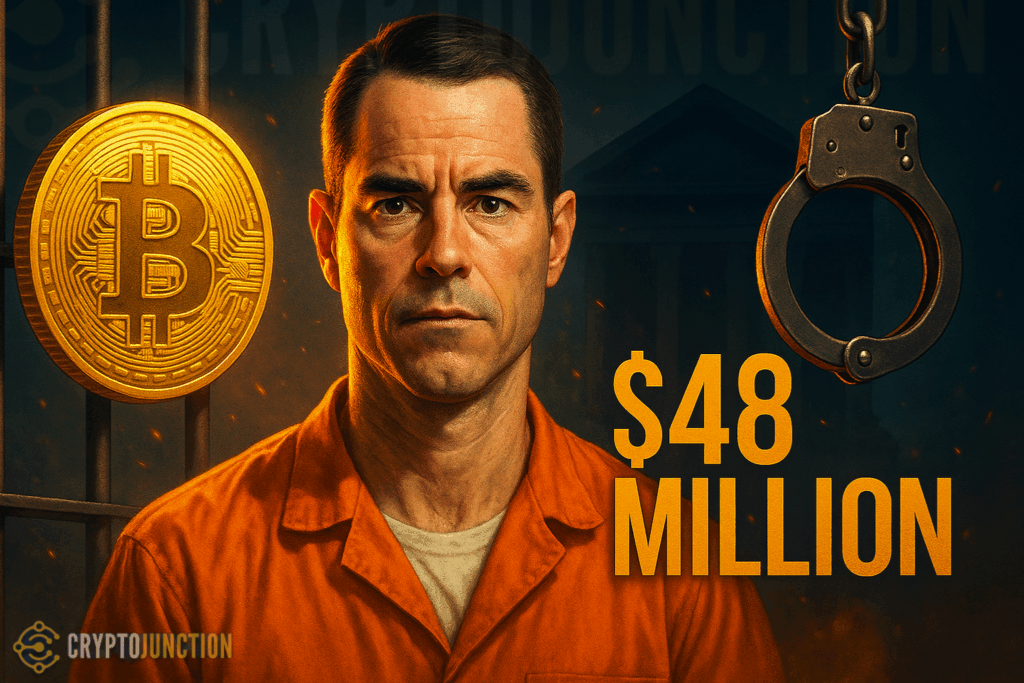In April 2024, the headlines exploded: Roger Ver had been arrested and charged with mail fraud, tax evasion, and filing false tax returns. Prosecutors accused him of concealing his Bitcoin fortune from the IRS. This allegedly cost the U.S. government a staggering $48 million. For a man once celebrated as a freedom fighter for digital money, the fall felt biblical.
Crypto Twitter went ablaze. Supporters cried foul, calling it a witch hunt against one of Bitcoin’s earliest believers. Critics, however, saw poetic justice—proof that even “crypto messiahs” aren’t above the law. Even amidst controversy, Roger Ver remains a central figure.
Roger Ver’s “Tentative Agreement” With The DOJ
In a development that stunned both supporters and skeptics, Roger Ver reportedly reached a “tentative agreement” with the U.S. Department of Justice over his criminal tax charges. According to The New York Times, Ver may pay close to $48 million to the government in restitution. This figure is eerily close to the amount he was accused of evading.
Sources familiar with the matter suggest that if Ver fulfills the terms of the deal, authorities could drop the charges entirely. In short, “Bitcoin Jesus” might just walk free, illustrating Roger Ver’s remarkable resilience even in legal challenges.
When contacted by The Block, the DOJ declined to comment. Ver, when reached separately, offered only a two-word response: “No comment.” The silence only deepened the mystery, fueling speculation and hope among his followers that a comeback could be on the horizon.
Meanwhile, the broader political backdrop is shifting. Since President Donald Trump returned to Washington D.C., his administration has moved aggressively to reshape crypto policy. Multiple investigations into big players like Coinbase and Binance have quietly been dropped. Pro-crypto officials now occupy key roles in federal agencies. As a result, Roger Ver finds an unexpected ally in the political arena.
Trump’s stance on digital assets appears not just lenient but openly supportive—a dramatic change from past administrations. It’s within this friendlier climate that Ver’s situation may be finding its lifeline.
Roger Ver, Ross Ulbricht, And The Power Of Redemption
Adding another twist to the narrative, Ross Ulbricht, the founder of Silk Road, publicly voiced his support for Ver earlier this year. After receiving a presidential pardon from Trump in his first few days in office, Ulbricht took to X posting:
“Roger Ver was there for me when I was down and needed help. Now Roger needs our support. No one should spend the rest of their life in prison over taxes.”
The message struck a chord across the crypto community. For many, it symbolized a moment of unity among early pioneers who built—and suffered for—the ideals of a decentralized economy. Their voices rally around figures like Roger Ver.
Even the prediction market Polymarket saw a ripple effect. Following the news of Ver’s tentative agreement, bettors increased the odds of Ver receiving a Trump pardon from 23% to 29% within hours. The sentiment was clear: the tide might finally be turning for one of Bitcoin’s most controversial figures.
A New Chapter For “Bitcoin Jesus”?
If the agreement goes through, Roger Ver could soon reclaim his freedom—and perhaps even his place in the crypto narrative. But his story now carries a deeper irony. The man who once fought to free money from government control may owe his liberty to a deal struck with that very system.
Whether this marks redemption or resignation, Ver’s case captures the essence of crypto’s modern struggle—a tug-of-war between rebellion and regulation, idealism and reality.
For now, the world watches closely as Roger Ver’s fate hangs in the balance. One thing is certain: the saga of “Bitcoin Jesus” has never been short of surprises. The next chapter might just be the most dramatic yet. Supporters and critics alike are enthralled by the unfolding saga of Roger Ver.

